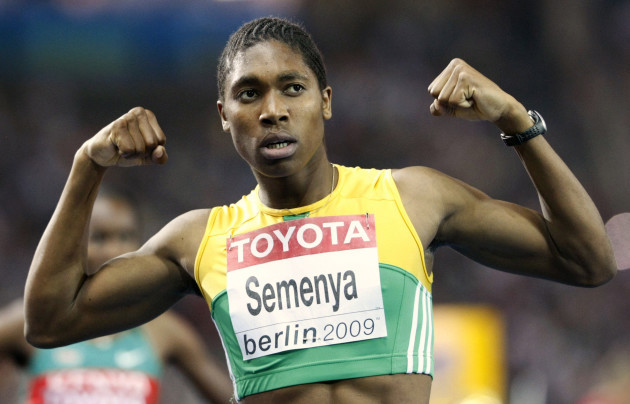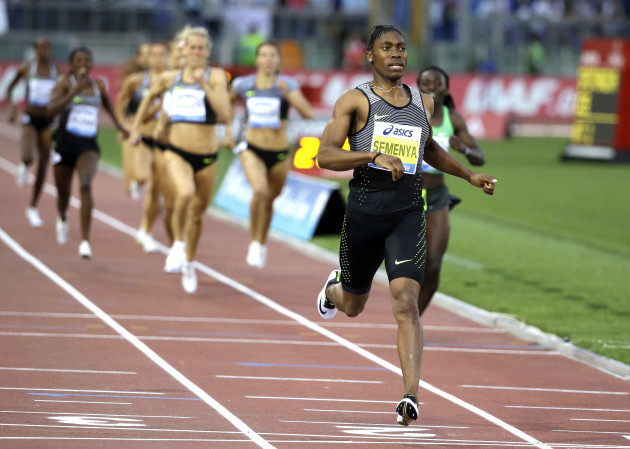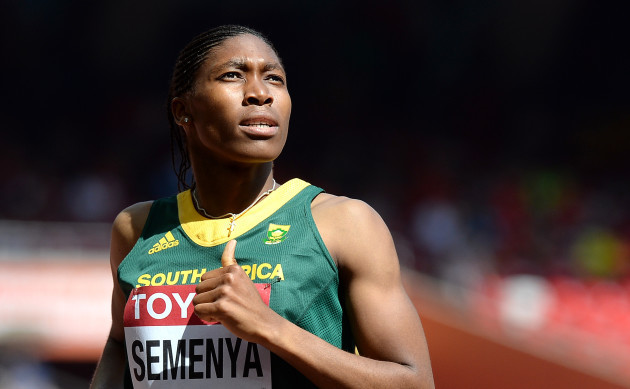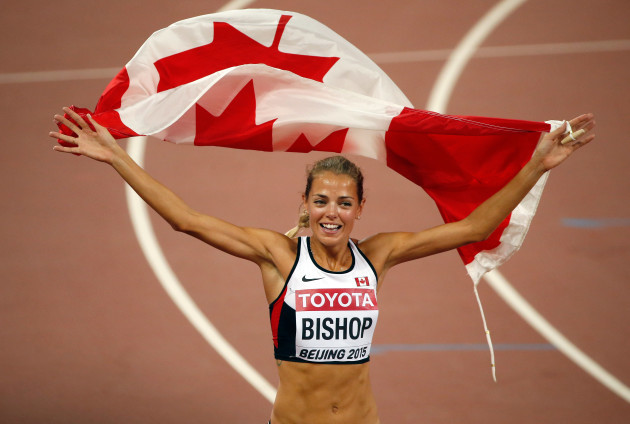I’m overwhelmed. I didn’t expect to run fast times like this. I had fun. You’ve got to enjoy what you do and that’s what I’ve been doing in this championship. I haven’t had fun in a while.”
- Caster Semenya, The Times Live, April 2016.
ON 16 APRIL this year, Caster Semenya took to the track in Coetzenburg Stadium to compete in the South African Senior Athletics Championships. In the space of three hours, she won the 400m, 800m and 1500m titles, a feat — understandably — never achieved before.
The accomplishment was all the more remarkable in that she achieved Olympic qualification times in both the 400m (50.74) and 800m (1:58.45) while her 1500m time of 4:10.93 was just four seconds outside the mark needed for Rio.
Going into Wednesday morning’s 800m heats, there is, according Ross Tucker – Professor of Exercise Physiology with the School of Medicine of the University of the Free State in South Africa but better known to some as Science of Sport on Twitter — “no surer gold medal” at these Olympic Games.
Indeed, Tucker told The42 this week that Semenya could “trip and fall” on the first lap of the race and still dust herself down to win the final.
In fact, the only thing more certain than the top step of the podium for the 25-year-old is the inevitable controversy that will come with her success.
For better or worse, Semenya has become the poster girl for the debate around the inclusion of so-called intersex competitors in athletics.
Her rise to global prominence begins in 2009, mere hours before she won the women’s 800m final by 2.5 seconds, when she was unfairly, and unforgivably, “outed” as having undergone gender tests at that year’s Berlin World Championships thanks, in large part, to a combination of ineptitude and arrogance from South African athletics officials.
What happened in the German capital is easy to forget, though not for the athlete herself.
Just three hours before Semenya ran 1:55:45 in blitzing the field, news leaked from the IAAF that she had been subjected to “gender verification tests” in her home country and at the Championships — with an endocrinologist, gynaecologist and psychologist all attempting to establish whether the then 18-year-old, who had lived her whole life as a woman, was actually a man.
That any woman should be confronted with questions over her gender in such a public sphere must be difficult. That it would play out in front of a worldwide audience of millions in the build up to the biggest race of her life, seemed beyond cruel.
But Semenya raced on and took World Championship gold in her stride. Noticeably, she did not appear at the traditional winner’s press conference 30 minutes after her victory with the IAAF secretary-general Pierre Weiss saying it was “to protect her.”
In the wake of her case, testing was introduced to identify cases where testosterone levels were elevated above an arbitrary level, termed hyperandrogenism and suddenly the sporting world had a relatively new word to come to terms with.
Hyperandrogenism
In 2011, the IAAF announced that the arbitrary limit it was placing on female athlete’s testosterone levels would be 10nmol/L, with anyone above it required to take hormones to lower them to compete.
The problem, according to David Epstein – investigative reporter at ProPublica and the author of the New York Times bestselling book The Sports Gene — is that “someone is always going to feel as if they are being treated unfairly, you just have to decide who.”
“There’s definitely a feeling in the general public that there needs to be definition,” he told The42.
“But the fans in the US, for example, well they’re not good athletics followers. However, that won’t stop them weighing in on what they believe women should look like and particularly what female athletes should look like.
“That’s a challenge for the IAAF. Sport is, traditionally, divided into two very clear categories. But the governing body acts like they can draw a very clear line between male and female — that’s simply not the case.
“For most of us there are six levels of definition including, chromosomal, biological and genitalia but, for some people, there are no answers that science can give you.”
Inevitably, in part because of the issues outlined by Epstein above, there were challenges to the ruling and it was reversed in July 2015 when the Indian sprinter Dutee Chand — who was dropped from the 2014 Commonwealth Games at short notice — successfully appealed to the court of arbitration for sport (CAS) who ruled that there was “insufficient evidence that testosterone increased female athletic performance.”
With that in mind, they suspended the practice of testosterone regulation and challenged the IAAF to present better evidence by July 2017.
Return to form
Under the old ruling, Semenya was running much slower times, averaging 2:01 for the 800m. Since CAS’s intervention, she has run faster and faster, with a 1:55 in Monaco showing just what she is capable of.
For Tucker, this isn’t even the limit of what she is capable of.
“I said to David (Epstein) when I met him earlier this year that Caster should just run a 1:51 and then everyone would sit up and take notice of how ahead of the rest she is.”
The argument that both Epstein and Tucker make is that the Olympics have a binary system of male and female for the simple reason that no woman would ever qualify — with the exception of equestrian events — if they had to compete with men.
And while some make the argument that it’s unfair for an athlete with hyperandrogenism to compete against women, Tucker says it’s also unfair to ask an athlete who has lived her entire life as a woman and competed against women her whole career, to suddenly start racing against men.
“If an athlete has identified as a male their entire life and then asks to compete as a woman, I think that’s a very different situation but it would also be unfair to ask (Semenya) to compete against men because she cannot fully use the testosterone she produces the way a man can.”
This is where a definition, another one, could come in handy says Epstein, but it will never be perfect.
“The way that science works, four of us could see the exact same data and all come to different conclusions. At one point they picked testosterone but someone is going to be treated unfairly, you just have to decide who.
“It’s a difficult situation because it pertains to sex and genitalia. People wouldn’t even know most of the time if they were looking at an intersex athlete. It’s so not an issue most of the time and then, here in the US, suddenly bathrooms and who can use them become the centre of the debate.
“But on athletics, there is a really fair question to ask about what does the female class of athlete mean and what’s considered a fair natural advantage and an unfair one.
“The fact is, if we want to see level competitions we’d only have identical twins so the goal has to be to level the rules, not the ability.”
In The Sports Gene, Epstein deals with how widespread the rate of intersex athletes is. In the general population, one in approximately 80,000 women have a Y chromosome rather than a typical XX. Over the course of five Olympic Games, Epstein say, that rate was 1 in 421 for female competitors.
So why not just simply decide that if a person is XY they’re male, if they’re XX they’re female?
Once more, Tucker says that while it is a relatively simple task to check someone’s chromosomes, it completely ignores the societal and cultural implications of wiping out a person’s entire life as a woman never mind the importance of self-identification.
It’s something Epstein agrees with:
“I’m not really sure what recourse is open to the IAAF. I don’t totally disagree with the CAS decision as you have to balance what people thinks is fair with having the IAAF involved in sex testing.
“As someone working in the area, I’m upset about the mis-portrayal of some of the science and, by all means the IAAF should commission a new study if they want to, but eventually you have to draw the line somewhere.
“So if you’ve lived as a woman, been raised as a woman, then you should compete as a woman.”
Outcome
Right now, it would cost you €100 to win just €10 if you were to bet on Semenya to take the women’s 800m title in Rio, such is the level of expectation around the 25-year-old.
And while the absence of Russian athletes only strengthens the likelihood she’ll win the event comfortably, Francine Niyonsaba of Burundi, Canada’s Melissa Bishop and the Kenyan Margaret Wambui will all hope to contest the medals.
For Tucker, who often finds himself accused of being both overly critical of South African athletes and not being hard enough, a Semenya win — barring injury or accident of some sort — is inevitable. But how will it be greeted?
“In South Africa, her win will be celebrated. Because she’s a black athlete and a female athlete, she’s seen as representing those fighting against black oppression and female oppression. There’s more nuance than that, but that’s how it will be seen.”
Epstein too says that Semenya debate will be coloured by its impact on society as much as what happens on the track.
“I think the Caster story is more a societal one than it is an athletics one. Most don’t care about women’s 800m and certainly most wouldn’t be able to name the competitors they might perceive as being about to lose out on a medal because of Caster.”




